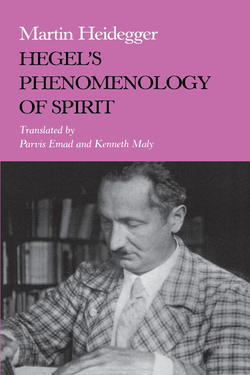Читать книгу Hegel's Phenomenology of Spirit - Martin Heidegger - Страница 6
ОглавлениеContents
IntroductionThe Task of the Phenomenology of Spirit as the First Part of the System of Science
§ 1. The system of the phenomenology and of the encyclopedia
§ 2. Hegel’s conception of a system of science
a) Philosophy as “the science”
b) Absolute and relative knowledge. Philosophy as the system of science
a) “Science of the Experience of Consciousness”
b) “Science of the Phenomenology of Spirit”
§ 4. The inner mission of the phenomenology of spirit as the first part of the system
a) Absolute knowledge coming to itself
b) Misinterpretations of the intention of the Phenomenology
c) Conditions for a critical debate with Hegel
§ 5. The presupposition of the Phenomenology: Its absolute beginning with the absolute
a) The stages of spirit’s coming-to-itself
§ 6. Sense certainty and the immediacy
a) Immediate knowledge as the first necessary object for us who know absolutely
c) The immediacy of the object and of the knowing of sense certainty. “Pure being” and extantness
§ 7. Mediatedness as the essence of what is immediate and the dialectical movement
a) Intention as the essence of sense certainty. The singularity and universality of intending
§ 8. Consciousness of perception and its object
a) Perception as mediation and transition from sense certainty to understanding
b) The thing as what is essential in perception. Thingness as the unity of the “also” of properties
§ 9. The mediating and contradictory character of perception
Chapter Three Force and Understanding
§10. The absolute character of cognition
a) Absolute cognition as ontotheology
b) The unity of the contradiction of the thing in its essence as force
c) Finite and absolute cognition—“Appearance and the Supersensible World”
§11. The transition from consciousness to self-consciousness
a) Force and the play of forces. Being-for-itself in being-for-another
b) The appearance of the play of forces and the unity of the law
c) The infinity of the I. Spirit as λόγος, I, God, and ὄv
§12. Self-consciousness as the truth of consciousness
a) “The Truth of Self-certainty”
b) The significance of the transition from consciousness to self-consciousness
§13. The being of self-consciousness
a) The attainment of the self-being of the self in its independence
b) The new concept of being as inhering-in-itself, life. Being and time in Hegel—Being and Time
